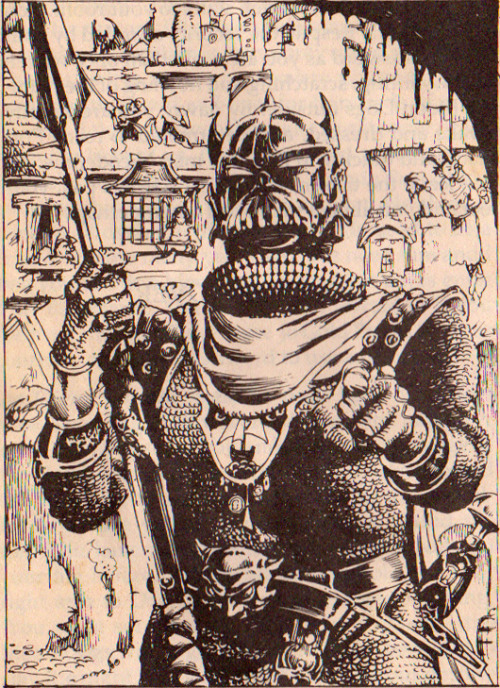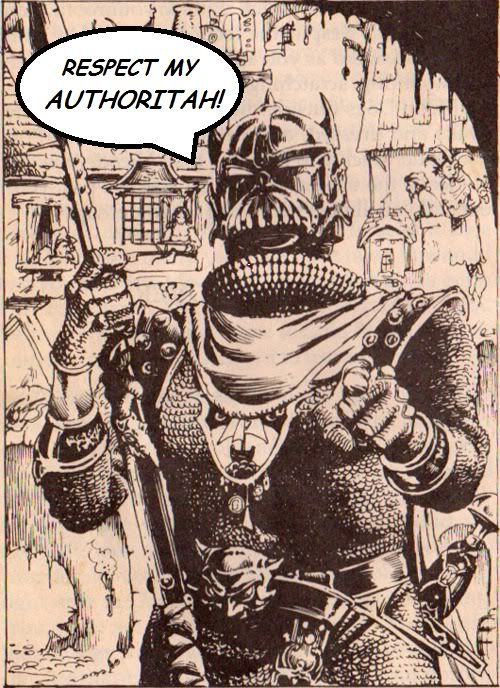Let's pretend D&D only consists of the following scenes:
- Mundane Travel w/ encounters
- Mundane shopping
- Mundane NPC interactions (the boring gate guard)
- Social Manipulation of NPCs
- Getting Information from NPCs
- Solving Problems
- Traps
- Combat
While many have indicated that their group likes scenes 1-3, do they really prefer them over the other types?
For many groups, I think it depends on when. Yesterday (my weekly session), my players did a few things. The session spent about an equal amount of time in two areas.
One was while they were in town for three days. They spent the time talking to shop owners, setting themselves up to make some money in the meantime. They spent time telling me what they would be doing (one PC used the Evasion skill to tumble around), how they were augmenting it with their other skills (instead of just saying "I got a 20 on my check" he included Move Silently to shadow people without getting noticed to amuse on-lookers, Climb to climb up the shop and backflip off [with permission on the understanding that he'd then direct people into the shop], etc.), and interactions with on-lookers.
This PC directly competed (across the street) from another PC who was juggling, who also described how he was using skill to augment himself (Martial Prowess to juggle knives and drawing them very quickly and sheathing them very quickly, Evasion to backflip between knife throws, Jump to hop onto and off of empty wooden boxes while juggling the knives, etc.), and his interactions with citizens.
Another PC went into a tavern and tried to get in good with the tavern owner (role-play conversation, then the Empathy skill). He felt it went okay, then tried to convince him to let him play in his tavern/inn for a free room (role-play, then Negotiation skill), and didn't get the room, but got some free drinks instead. The next day he asked for a free room if he played all day, and the guy agreed, as long as the bard brought business in. The bard spent the day trying to convince the townspeople to go to the inn/tavern tonight, where he'd be playing, and everyone would have a good time (role-play, then Leadership and Negotiation checks). When people did show up, he rolled his Perform (telling me how he was using the skills [storytelling, harp, flute], and what he was singing about), and then got his room for free, as promised. The player also tried to chat up a woman (Empathy skill) before leaving the next day.
I have six players, but I'll stop at three (well, one stayed outside, but he did sum up what he was doing in the meantime, including watching the horses and the bodies they were hiding [the party has a necromancer]). While these activities involved some die rolls (the players wanted to make these actions succeed as reliable as possible), none of it was necessary. It was just them having fun. And they did have fun.
Sure, later on they tracked down a former mentor in the woods (mostly role-play [literally no rolls other than a Spot and Listen when he first approached]), got some advice and help, then tracked down an enemy and killed him (finding more clues to who he's working for). And yes, they're now looking for a man they don't know (that the clue indicated) who also serves "The Master" (who they think they've identified as Hadraccan, a long-dead mage's apprentice). While this basically took up the other half of the session, the mood was less jovial than the town mood was (though the necromancer took a perverse joy in killing his major enemy and reanimating him).
My players get different types of enjoyment out of different things when they role-play. The first part is interacting with the world in a mundane but meaningful way. This lets them know what the world is like, how their character fits into it, what their reaction or mindset is, etc. It's carefree, fun, and simple. There's also a lot of fun and enjoyment to be had with my group in laying the beatdown on some bad guys. Or looking for clues on who to go to next. Or intrigue. Or investigation. Or interactions with old friends or enemies. Or "advancing the story" of whatever they're currently pursuing.
Really, often times it's simply just looking for ways to advance character motivations (it's a sandbox). But, my players can have a lot of fun in a lot of different ways. I don't think labeling "the mundane events that are a waste of time" as "unfun" is particularly wise in the DMG (or in general).
To answer your question ("While many have indicated that their group likes scenes 1-3, do they really prefer them over the other types?"), I'd say that sometimes yes, and sometimes no. Sometimes, they want to explore their character's motivations in ways that are lighthearted. Simple. Mundane. Real. It helps connect them to their characters, to get into their heads, to learn something about them. And I think that's totally fine.
Trumpeting non-challenging mundane events as "unfun" or "a waste of time" is extremely dismissive and objectively wrong for many groups. It is not advice worthy of being in the DMG, in my opinion. As always, play what you like






